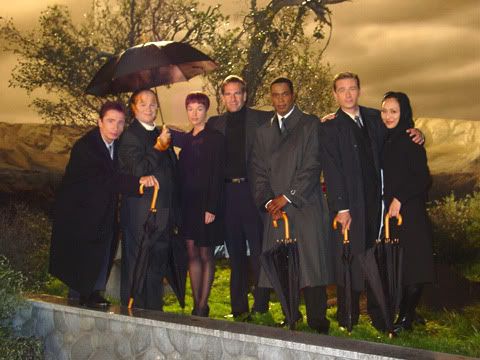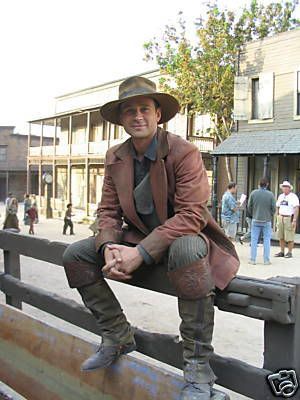-
Welcome! The TrekBBS is the number one place to chat about Star Trek with like-minded fans.
If you are not already a member then please register an account and join in the discussion!
You are using an out of date browser. It may not display this or other websites correctly.
You should upgrade or use an alternative browser.
You should upgrade or use an alternative browser.
ENT Review - New ST Watcher
- Thread starter voxstella
- Start date
You could argue that if it was known that Starfleet had cloaking, that would mitigate their advantage and start a cloaking arms race, whereas if it was reserved for S31 black ops they could retain the element of surprise.
But wouldn't Trip's efforts be documented in the Starfleet database?
Probably the same place the exile of Khan to Ceti Alpha V is recorded.
Oh yeah, the big round file.

Or the same place Archer's reports about the Ferengi and the borg ended up.
Or the same place Archer's reports about the Ferengi and the borg ended up.
Either Archer didn't think that the borg were enough of a threat to write a report about them or since they (strangely) never introduced themselves (somehow they removed "we're the borg" from they introductory message), he filed the report under machine guys..
 And no one ever thought about looking there.
And no one ever thought about looking there.Re The Communicator: I guess I found the doctor's argument to be extremely persuasive.
Stigma:
I liked this episode even though it was heavy handed. The AIDs comparison was not subtle. I found Phlox's deception in the beginning to be weak. It's no wonder the Vulcan physicians were suspicious. Secretly taking T'Pol's DNA seems like an invasion of privacy.
I thought Archer reacted too strongly to T'Pol's lie. He took it as a personal betrayal, even though she kept it secret due to cultural reasonings. I liked Yuris. His cadence was an interesting contrast to the other Vulcan doctors. His tone is soft whereas the other Vulcans speak in clipped tones. I thought finding out that Yuris was a mind melder had a great impact on T'Pol. He's decent, unlike Tolaris. I wasn't sure about his outing. It seemed unrealistic? It's analogous to telling your boss how exactly you feel about him the day you quit your job.
I enjoyed T'Pol's support of mind melders because she used to view them very negatively. I thought Yuris went a long way to helping T'Pol realize that mind melders can be valuable members of society. I thought Vulcan attitude towards Panaar Syndrome to be very illogical. IDIC, after all.
I thought the show did a good job at explaining how the Vulcans would use T'Pol's victimization as an excuse. She would still be good because it wasn't her fault. She was coerced. The other mind melders are still bad. They aren't your neighbors or children or friends. I don't think T'Pol can be too furious that Yuris spilled his guts. His "betrayal" was understandable. There's a way for T'Pol to not be punished. That's if the events surrounding her disease were revealed.
Stigma:
I liked this episode even though it was heavy handed. The AIDs comparison was not subtle. I found Phlox's deception in the beginning to be weak. It's no wonder the Vulcan physicians were suspicious. Secretly taking T'Pol's DNA seems like an invasion of privacy.
I thought Archer reacted too strongly to T'Pol's lie. He took it as a personal betrayal, even though she kept it secret due to cultural reasonings. I liked Yuris. His cadence was an interesting contrast to the other Vulcan doctors. His tone is soft whereas the other Vulcans speak in clipped tones. I thought finding out that Yuris was a mind melder had a great impact on T'Pol. He's decent, unlike Tolaris. I wasn't sure about his outing. It seemed unrealistic? It's analogous to telling your boss how exactly you feel about him the day you quit your job.
I enjoyed T'Pol's support of mind melders because she used to view them very negatively. I thought Yuris went a long way to helping T'Pol realize that mind melders can be valuable members of society. I thought Vulcan attitude towards Panaar Syndrome to be very illogical. IDIC, after all.
I thought the show did a good job at explaining how the Vulcans would use T'Pol's victimization as an excuse. She would still be good because it wasn't her fault. She was coerced. The other mind melders are still bad. They aren't your neighbors or children or friends. I don't think T'Pol can be too furious that Yuris spilled his guts. His "betrayal" was understandable. There's a way for T'Pol to not be punished. That's if the events surrounding her disease were revealed.
"Stigma" is a bit controversial because T'Pol did willingly mindmeld, although when it became disturbing she wanted to stop. I think the writers genuinely forgot what happened in "Fusion" when they wrote this episode, but their mistake makes T'Pol look like a hypocrite or a liar.
"Stigma" is a bit controversial because T'Pol did willingly mindmeld, although when it became disturbing she wanted to stop. I think the writers genuinely forgot what happened in "Fusion" when they wrote this episode, but their mistake makes T'Pol look like a hypocrite or a liar.
It seems to me that it's just retconning as usual.
I live to serve.Is there a larger version of that one?Whatever your opinion of "A Night in Sickbay,", we can thank it for this fabulous behind-the-scenes picture.


There's a picture that demands a caption. Are there more posed behind the scenes pictures? Because there should be, especially for North Star.
I don't know about posed, but...
Desert Crossing:

Marauders:

North Star:


There are more, need to dig for 'em tho.
And now back to your regularly rescheduled reviews.

"Stigma" is a bit controversial because T'Pol did willingly mindmeld, although when it became disturbing she wanted to stop. I think the writers genuinely forgot what happened in "Fusion" when they wrote this episode, but their mistake makes T'Pol look like a hypocrite or a liar.
With Yuris? I think it could be that he was risked his career to help her. I think it could be a defiant reaction to the High Command's action. Or it could be that the writers forgot what happened in Fusion (which would be very, very sad).
Cogenitor:
I liked this episode very much even though you could spot the doomed ending a mile away.
The Vissians were associated with light imagery. They're dressed in white robes. Whenever we see them, the lightening is soft and bright. The Visions are blonde and blue-eyed, evocative of western depictions of angels. The Vissian captain's fondness for Shakespeare represents Vissians' taste towards high culture--classic works as nourishment for the soul.
The Vissian's physical appearance is contrasted with their callous treatment of the co-genitor. Like Trip pointed out in his conversation with T'Pol, the Vissian engineer treat the cogenitor as if she was a disposable object or pet.
While T'Pol had a point about respecting alien culture, the counter-point to her position is that the cogenitor didn't freely chose her status in Vissian society. Is slavery acceptable just because a society condones it?
The engineer and his wife, which I intensely disliked, talked about how the cogenitor's actions impeded their chance of having a child. 'Do you know how long we've waited...' makes the debate about them and not a question about a sentient being's autonomy. For all the Vissians are associated with enlightenment, what lurks behind the surface is something darker.
I wondered if T'Pol's position would have differed if Vulcan society encouraged individualism. Vulcan society preaches the needs of the many outweigh the needs of the few. From a strictly unitarianism perspective, the cogenitor provides substantial benefit to her society if she remains in her current role. Whatever rights she has towards an individual identity is irrelevant.
Also, considering how technology advanced Vissian society is, why haven't they ever bothered researching alternative methods of conception? They could try synthesizing the enzyme that the cogenitor provides. What if a freak disease robs Vissian society of all their cogenitors? It's fool-hardy to rely on 3% of your population for your species' survival.
I thought Archer's decision was pragmatic. He spent the last two days interacting with an alien wiling to share amazing technology, and shocker of shocker they aren't asking for a pound of flesh in return. Furthermore, he bonded with the Vissian captain through their shared love of Hamlet and that near death encounter. I think one of the reasons why Archer went out to space is to explore, make those first contacts and connect with the other side. Trip's actions undermined the relationship and feeling of success Archer achieved over the last two days. It served as a professional and personal betrayal.
I thought the ending was impactful. Sometimes, good intentions aren't enough. Trip was naive. He kept thinking that Archer would be on his side. Trip's initial actions was motivated by a desire to help, but he let the genie out of the bottle. The cogenitor's suicide is not something he could predict, but in hindsight--is introducing the caged bird to the fact she's caged and going to remain caged going to end well? Trip gives the cogenitor false hope and it ends up killing her.
The show made the cogenitor's end more tragic by showing her evolution. In the beginning, she distrusted Trip. She's afraid. She wants to remain within the stratified lines of her role. Then she learns how to read. It opens a world for her. She displays delight. She acts as if she was a young child, learning these experiences for the first time. There's a sense of wonderment. When she beats Trip, it shows her potential. The metaphor of climbing mountains expands on the idea that the cogenitor's potential is limitless if not for the society she is bounded by.
The suicide can be seen as an act of defiance. It's within her control. It's something that the Vissians can't take away from her. Furthermore, the cogenitor is at a point of despair. Now that she knows she can't go back to old life (i.e. Bovary, Madame Butterfly).
I think Archer was harsher than he should have been. Trip fucked up, but it's not as if Archer hasn't committed actions in the same spirit as Trip. They just didn't entail exchange of useful technology that was in the Vissian situation. Archer's previous actions were motivated by a desire to help the impoverished. Whether or not that makes him a good leader is up to debate.
The reference to Hamlet caught my attention. In a way the episode is analogous to what happens in Hamlet. Not just because everyone dies but one person's motivations causes a change of events that neither fulfills the initiator's desires nor leaves anyone else satisfied.
It's also interesting that the episode took place next to a burning sun. It reminds me of supernovas, which the cogenitor could be analogous to. Her moment to be brilliant lasted but for brief moments before she was extinguished.
While T'Pol had a point about respecting alien culture, the counter-point to her position is that the cogenitor didn't freely chose her status in Vissian society. Is slavery acceptable just because a society condones it?
I think T'Pol's point of view is that nothing good comes of trying to interfere with other cultures. Based on Earth history, I think she's right.
I think she's right that we shouldn't interfere with other cultures (see western interference with the Middle East). But I'm bothered by the fact that she doesn't acknowledge there's something seriously wrong with how the Vissians treat their cogenitor.
Similar threads
- Replies
- 27
- Views
- 1K
- Replies
- 23
- Views
- 3K
- Replies
- 178
- Views
- 29K
- Replies
- 12
- Views
- 2K
If you are not already a member then please register an account and join in the discussion!

